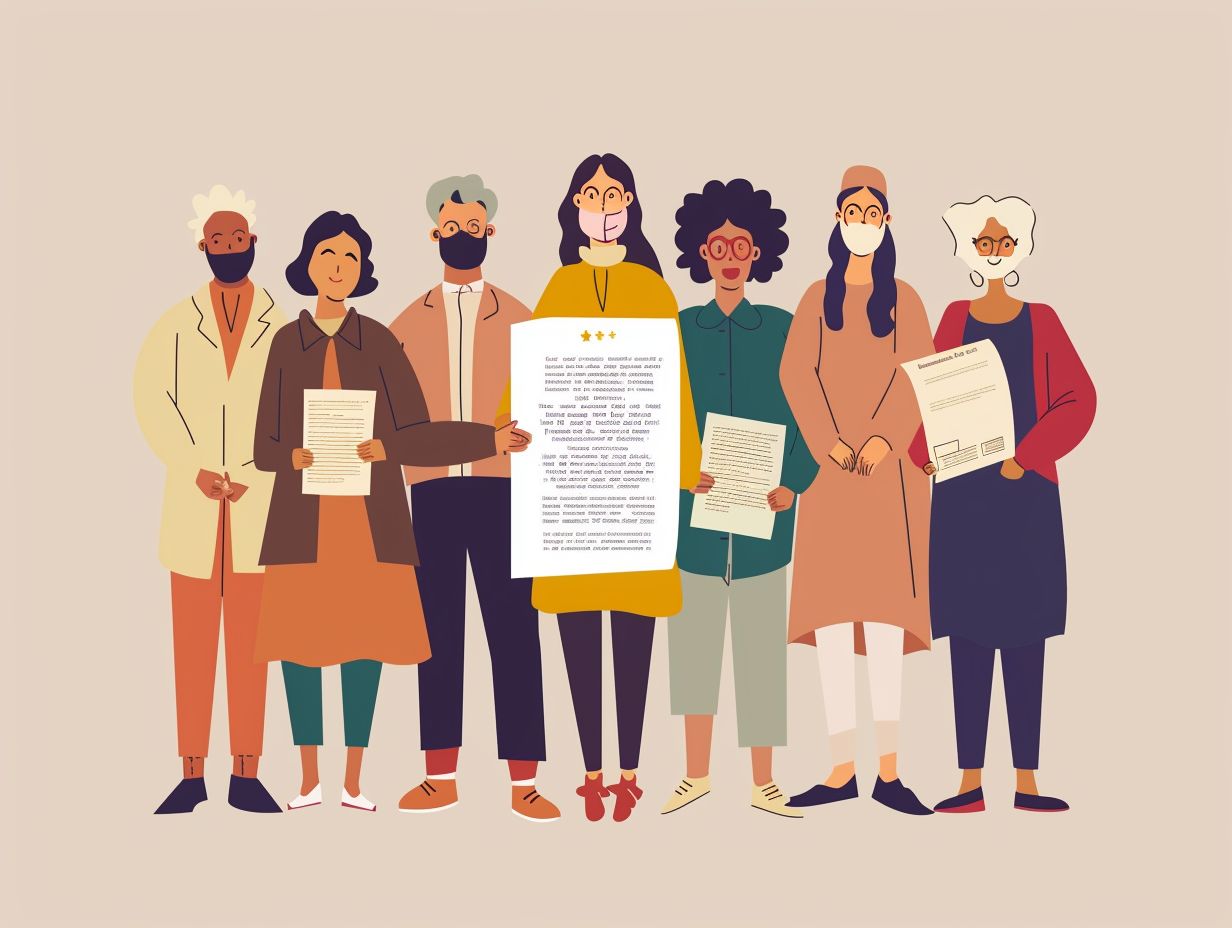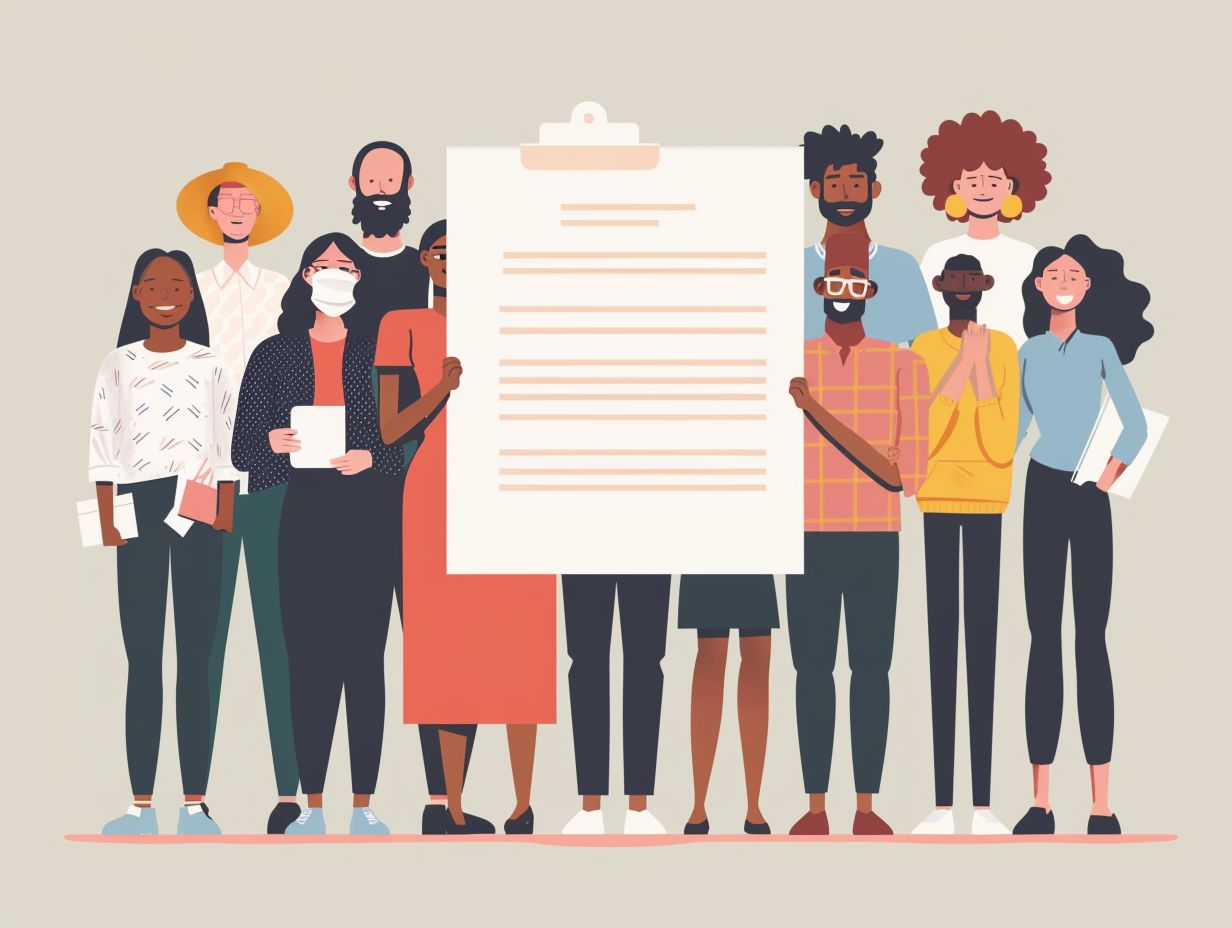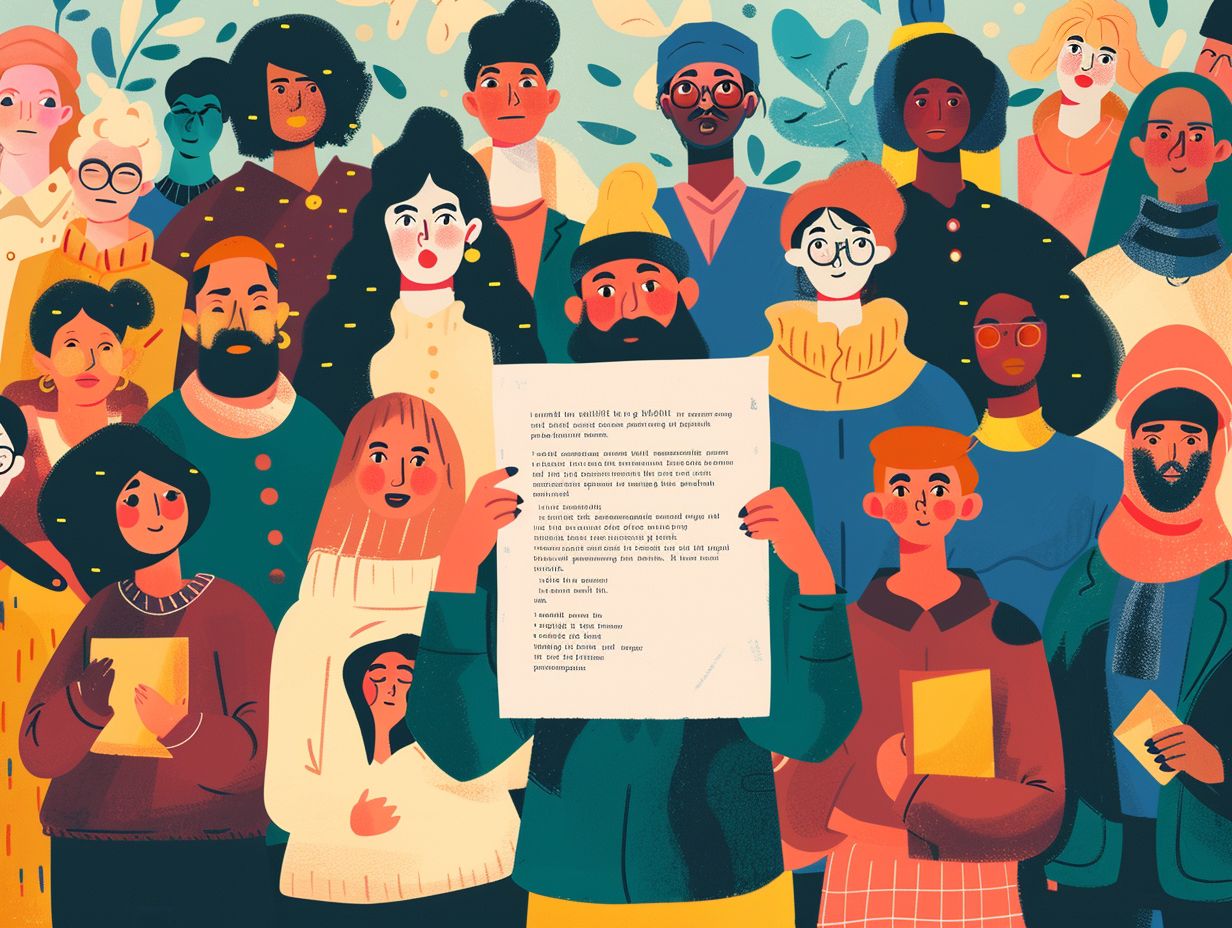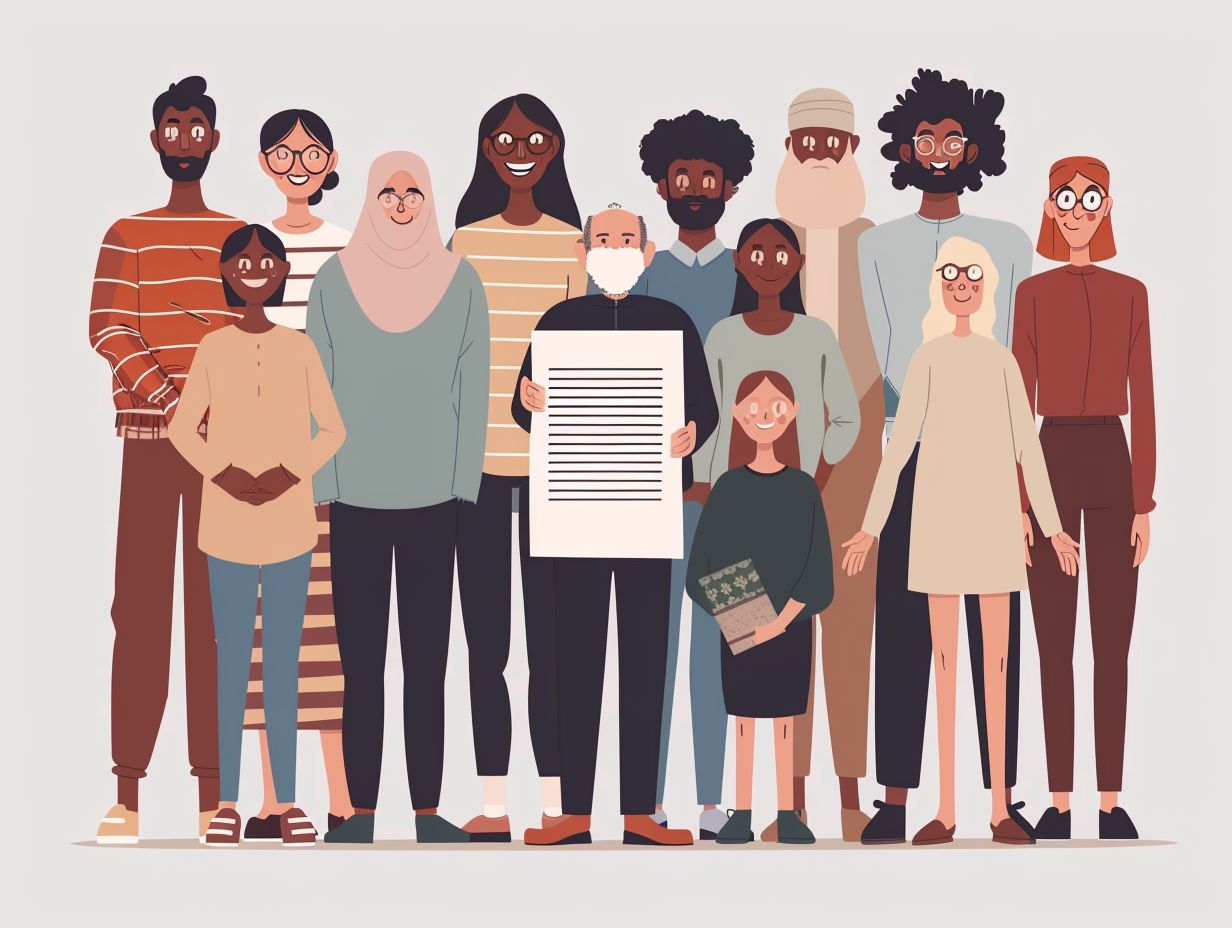Navigating the complex world of immigration might seem overwhelming, but it’s essential to know your rights and responsibilities as an immigrant in the United States.
Let’s walk through the immigration process together. We’ll cover everything from the various types of immigration status to the legal protections you have against discrimination.
You’ll discover the necessary steps to follow and the resources at your disposal to make sure you’re following the laws and regulations while also making meaningful contributions to society and the economy.
What are Immigration Rights and Responsibilities?

As an immigrant in the United States, it’s essential to understand your rights and responsibilities to ensure you’re a part of society and protected under the law.
To really feel at home here, you need to know your legal status and make sure you have all the right documents. These things are key to fitting in and making your mark. By doing your part, like paying taxes and following the rules, you’re not just helping out in your new neighborhood, but also showing you’re committed to the way things work in your new home. Balancing rights with responsibilities is the way to go for immigrants. It helps you figure out how things work here and lets you really become a part of the community.
Understanding the Immigration Process
You need to grasp the ins and outs of the immigration process in the United States. It’s crucial for you as an immigrant to tackle those tricky immigration laws, make sure you get treated fairly, and lock down the right legal status to call this country home and work legally.
Types of Immigration Status
In the United States, you can have different types of immigration status, like visas, green cards, citizenship, refugee status, or even being undocumented.
Each immigration status has its own rules, perks, and limitations. Visas are like temporary passes for specific reasons, like working or studying. Green cards give you permanent residency, letting you live and work in the U.S. forever. Citizenship is the full package, with rights like voting and running for office. Refugee status is for people escaping persecution in their home countries. If you’re undocumented, that means you’re living in the U.S. without legal permission. Moving between these statuses can get pretty tricky and may involve following specific paths laid out by immigration laws.
Steps in the Immigration Process
When you’re navigating the immigration process in the United States, you’ve got quite a few important steps to tackle. From applying for the right visa to gathering up all the necessary paperwork, getting that work permit, and eventually going through naturalization to snag a social security number.
Once you figure out which visa category fits your stay, the next big move is getting all your documentation in order and making sure it’s spot-on. That usually means showing proof of who you are, your financial backing, and any relevant medical records.
After you’ve turned in all your initial paperwork, you’re looking at sitting down for an interview with immigration officials to dig deeper into your eligibility. If everything checks out, you’ll move on to scoring a work permit – giving you the green light to work in the US legally while your immigration status is in the works.
Legal Rights of Immigrants in the US

If you’re an immigrant in the United States, you’ve got a bunch of legal rights to look out for. That means you’re entitled to civil rights, labor rights, voting rights once you become a citizen, and the right to have legal representation and protection under anti-discrimination policies.
Protection Against Discrimination
Ensuring protection against discrimination is a fundamental right for all immigrants. It guarantees you equal opportunities and fair treatment in all aspects of life, backed by strong non-discrimination policies and the availability of legal representation.
As an immigrant, discrimination can rear its ugly head in various forms. It could be in the form of unfair treatment in employment or housing, racial profiling, or facing xenophobic attitudes. Even though there are laws in place to protect you, many immigrants still face marginalization and bias.
It’s essential to recognize the vital role that organizations and legal aid services play in advocating for your rights as an immigrant. They offer valuable resources such as education on your legal rights, help in filing complaints, and representation in legal proceedings. These entities are your allies in the fight against discriminatory practices, working to promote inclusivity and justice for all immigrants.
Access to Education and Healthcare
As an immigrant in the United States, you have the right to access education and healthcare. This includes public education for immigrant children and healthcare benefits to ensure your well-being and integration into society.
Access to education is key for immigrants to assimilate into American society. It equips you with the skills and knowledge needed to succeed. Public schools are open to immigrant students and provide English as a Second Language (ESL) programs to support your learning.
Likewise, having access to healthcare services is crucial for your overall well-being and helps prevent the spread of diseases. When your rights to education and healthcare are upheld, the United States fosters inclusivity, social unity, and better public health across its diverse population.
Responsibilities of Immigrants in the US
As an immigrant in the United States, you need to make sure you’re following federal and state laws, paying your taxes, getting a driver’s license if you need one, and knowing your housing rights to keep your residency stable and legal.
Complying with Laws and Regulations

Complying with laws and regulations, including immigration laws, is a critical responsibility for you as an immigrant. It ensures you go through due process and maintain your legal status, helping you avoid any run-ins with ICE enforcement.
Understanding and following immigration laws isn’t just about fitting into your new country smoothly – it’s also about protecting your rights and opportunities. If you don’t follow these laws, you could face some serious consequences, like deportation, detention, or even being banned from coming back to the country.
To navigate the tricky world of immigration rules, you can tap into various resources like legal aid services, immigrant advocacy groups, and government assistance. These are all there to help you protect your rights and meet the legal requirements.
Contributing to Society and the Economy
You contribute significantly to society and the economy by engaging in employment opportunities, participating in community activities, and promoting social integration through your diverse cultural background.
Your presence adds to the tapestry of the community, bringing fresh perspectives and traditions that enrich the collective experience. By actively participating in various cultural events and initiatives, you not only celebrate your own heritage but also educate others, fostering mutual understanding and respect. This exchange of ideas and values leads to a more vibrant and inclusive society, where everyone has the chance to learn from one another and grow together.
You often start businesses, thus creating jobs and stimulating economic growth in your new homeland.
Resources for Immigrants
You have plenty of resources at your disposal as an immigrant in the United States. From community support programs and government services to immigrant advocacy organizations and legal assistance, there are various options to help you navigate your new life in the country.
Organizations and Services for Immigrants
If you’re an immigrant looking for support, you’re in luck! There are plenty of organizations and services out there that have your back. From immigrant rights groups to legal aid clinics, advocacy campaigns, and community resources, you’ve got a whole squad of helpers at your service.
These organizations are like your personal cheerleaders, providing legal advice, hooking you up with social services, finding job opportunities, and offering educational materials. Immigrant rights groups are all about fighting for fair policies and protecting your rights, while legal aid clinics give you free or low-cost legal help to navigate the confusing legal maze.
To tap into these resources, you usually just need to reach out to the organizations directly or swing by their community events and workshops. They’re here to help, so don’t hesitate to take advantage of what they have to offer!
Frequently Asked Questions

What are my rights as an immigrant in the United States?
As an immigrant in the United States, you have the right to due process, freedom of speech, and religious freedom. You also have the right to be treated fairly and not discriminated against based on your nationality or immigration status.
What are my responsibilities as an immigrant in the United States?
As an immigrant in the United States, it is your responsibility to follow all federal, state, and local laws. You are also expected to pay taxes, obey traffic laws, and contribute to your community in a positive way.
Can I be deported if I am an immigrant in the United States?
Yes, as an immigrant in the United States, you can be deported if you violate immigration laws or commit a serious crime. However, you have the right to a fair hearing and the opportunity to defend yourself before being deported.
What do I do if my rights as an immigrant are being violated?
If you believe your rights as an immigrant are being violated, you can seek help from an immigration lawyer or a local immigrant rights organization. You can also report any violations to the United States Citizenship and Immigration Services (USCIS).
Do I have the right to work as an immigrant in the United States?
Yes, as an immigrant with legal status, you have the right to work in the United States. However, you may need to obtain a work permit or employment authorization document (EAD) to legally work in the country.
What should I do if I am facing discrimination as an immigrant in the United States?
If you are facing discrimination as an immigrant in the United States, you can report it to the Department of Justice or file a complaint with the Equal Employment Opportunity Commission. You can also seek legal help from an immigration lawyer.